Is TruthFinder legit? Get the 411 on the popular people-search service
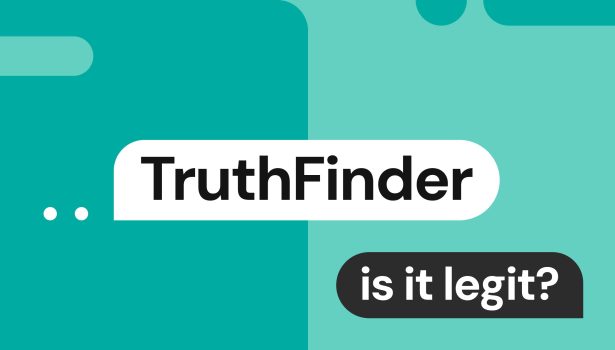
TruthFinder is a legitimate company that provides people-search services via reverse phone and name lookup. It’s been operating since 2015 and even has an A rating by the Better Business Bureau. The website is secure and your searches remain private.
However, TruthFinder has been criticized for presenting outdated or inaccurate information and marketing itself in somewhat deceptive ways. There are also ethical concerns inherent in people-search websites as they can’t check or control who’s using them and for what purposes.
What is TruthFinder?
TruthFinder is a public data broker AKA people-search site. These websites are kind of like the modern version of white pages—only publishing many more personal details.
TruthFinder has been around for a good ten years now (it launched in March of 2015). It currently belongs to the PeopleConnect network of data brokers that also owns such prominent people-search sites as Instant Checkmate and Intelius.
The platform can be used to:
- Find long-lost friends or distant family members
- Research people you meet online, including potential dates
- Learn more about your neighbors
- Find the owner of an unknown phone number that calls you
- Check whether someone is on the sex offender list
Though the younger generation typically reconnects with old friends or looks up birthdays on social media platforms like Facebook, sites like TruthFinder are still a go-to place for many people. A major reason for this is that these websites publish a lot of personal details openly and they typically pop up among the top results when you Google a person.
How does TruthFinder work?
People-search sites like TruthFinder aggregate data from a variety of publicly available sources. These include, but aren’t limited to:
- Public records (birth certificates, marriage certificates, property records)
- News articles (that time your local newspaper ran a story on you winning a high school wrestling tournament)
- Social media (anything posted publicly, including photos, is up for grabs)
When you activate a search on TruthFinder, it compiles the information found via these sources into personal reports. During the search, it might ask some clarifying questions like age or previous locations to narrow down the results. Basically, it acts like a classic search engine and presents the profiles it believes fit your query.
What personal details can you find on TruthFinder?
The free search provides limited information that may include:
- A person’s known aliases
- Their current address
- Relatives
- Age and birth year
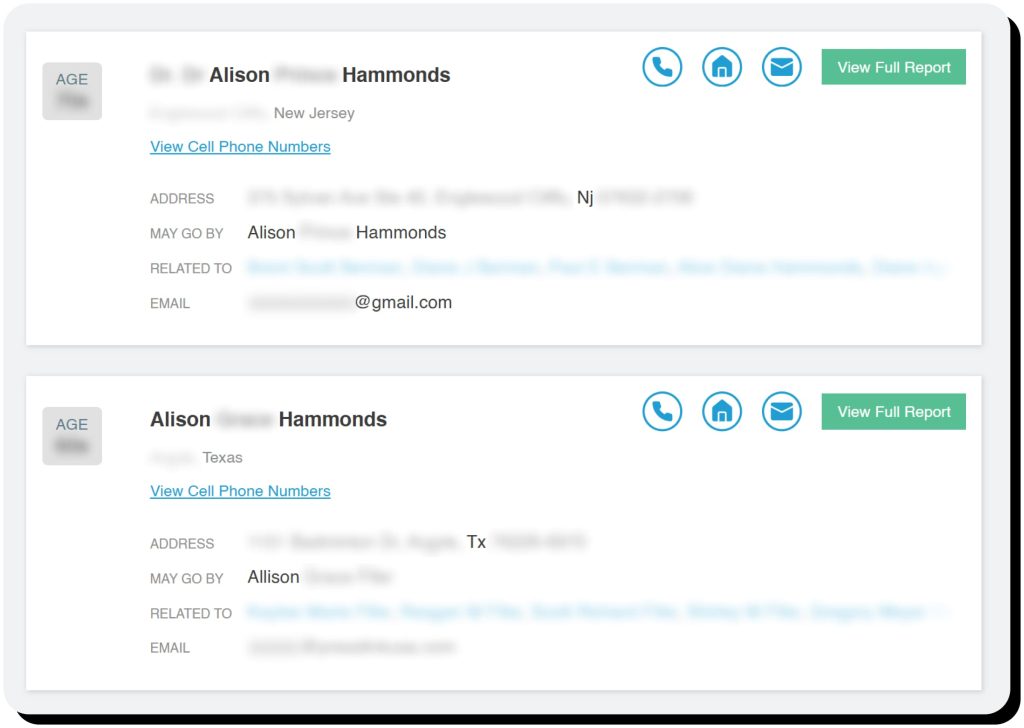
If you pay for a subscription, the resulting TruthFinder report provides the following data (if available):
- Full name and date of birth
- Employment and education background
- Contact info (phone numbers, email addresses)
- Current and past addresses
- Traffic and criminal records
- Social media profiles
- Professional licenses
- Property data, bankruptcies, and assets
However, there are specific details that you can’t learn from TruthFinder: SSNs, license plate numbers, marriage records, or divorce records. Even though TruthFinder claims it can help catch a cheater, it won’t show you people’s text messages—they don’t have access to personal communication, not to mention that it would be illegal.
Is TruthFinder safe to use?
As long as you use TruthFinder only for permitted cases, and you don’t violate the Terms of Use, then it’s safe. The company takes the following measures to ensure security:
- It uses HTTPS to protect data in transit
- Payments are processed via secure third parties
- It doesn’t notify people that you’ve looked them up
On the other hand, if you use TruthFinder for purposes other than the ones permitted by its Terms, it may be unethical or even illegal.
Is TruthFinder legal?
Even though believed to be an invasion of privacy by many, people-search sites are indeed legal. TruthFinder operates within U.S. laws and shows disclaimers regarding what it should not be used for.
However, there’s a certain amount of deception inherent in TruthFinder calling itself a “background check service” rather than simply a “people-search site,” since most of the situations in which someone might want to do a background check fall under the FCRA’s purview. The Fair Credit Reporting Act is designed to protect consumers from inaccurate or irrelevant information being used unfairly to make decisions about their credit, employment, housing, education, and other important opportunities.
The reason why TruthFinder can’t legally be used for these purposes is twofold: 1) it doesn’t investigate the accuracy of information in its reports, and 2) it doesn’t ask for consent from people who are being searched.
TruthFinder provides disclaimers warning not to use its data in ways that would violate the FCRA, but it can’t actually check why someone is running a search and there are plenty of people who don’t want to pay for legit background checks.
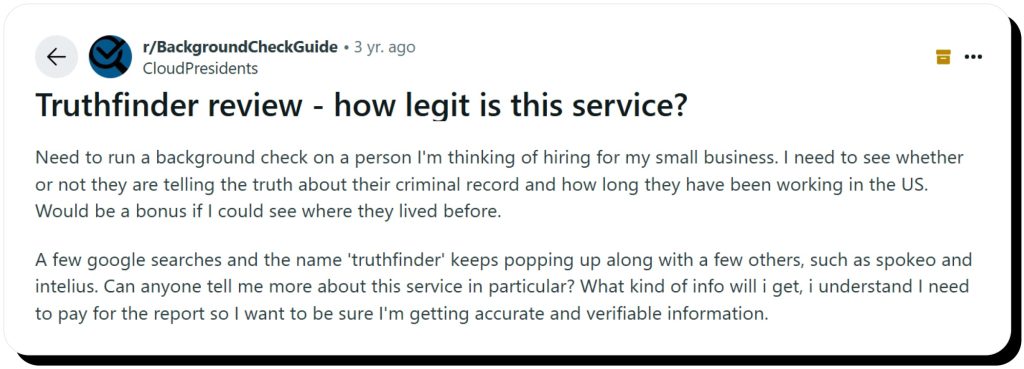
Privacy concerns
The legality of people-search sites hasn’t prevented numerous privacy experts and ordinary people from raising concerns over the lack of nationwide regulation that would close the people-search site industry or at least oblige the sites to remove personal info.
Part of the problem with data brokers as a general category is that they don’t disclose the specific entities they’re getting their information from. Another major issue is that they can’t control how this information is used. Disclaimers are easy to bypass and TruthFinder has no way of checking who a user really is. This opens the door for abuse by stalkers, scammers, cybercriminals, and just unethical employers or admission officers.
Moreover, since people-search sites don’t verify the accuracy of the data they publish, it’s not uncommon to see wrong criminal records attributed to the wrong person because they share a name with the actual perpetrator. Such mistakes can lead to a cancelled date at best, and lost job opportunities or damaged reputation in most cases.
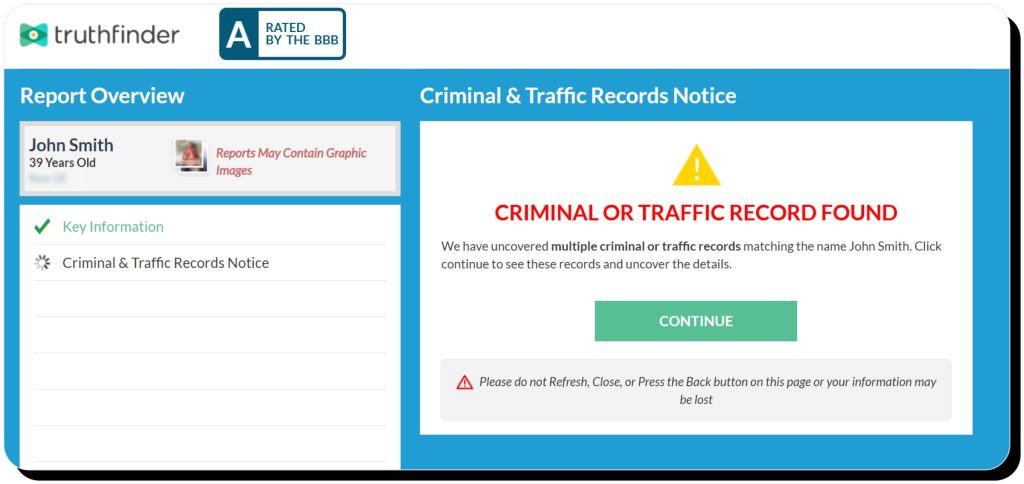
These issues lead to many people feeling that they have no control over their personal information and the government isn’t doing enough to regulate the industry.
On the flip side, TruthFinder does provide an option to remove your info from the site. You can follow our step-by-step guide to learn more about the process.
Can TruthFinder be trusted?
The irony of questioning the veracity of a service with the word “Truth” in its name cannot be ignored. That said, the concern is legit as the info on people-search sites should never be taken as a fact.
As we touched on previously, TruthFinder doesn’t investigate any of the sources it gets its data from. As an aggregator but not a verifier, it’s liable to have inaccuracies—even ones that are as destructive as attributing criminal records to the wrong person or warning about finding legal charges when it’s just a traffic ticket.
In fact, the FTC has fined TruthFinder and Instant Checkmate for claiming that their reports contain “the MOST ACCURATE information available to the public” in ads and other promotional materials, though it wasn’t so.
Ordinary users report frequent inaccuracies as well, leaving unsatisfied reviews on platforms like Trustpilot, BBB, and Reddit. They also report TruthFinder redirecting them to different people even when they’re searching for themselves.

In general, TruthFinder can be trusted for basic details like the name of someone who owns a particular phone number, but it must never be treated as 100% correct.
Is TruthFinder free?
TruthFinder does allow you to look up limited details for free, but ultimately, you’ll have to pay if you want to get a full report. Since there’s no option to pay for a single report, you’ll be directed to purchase a subscription for unlimited ones. These cost anywhere between $4.99 and $29.73 per month, depending on how in-depth you want to go.
TruthFinder also offers a 5-day trial for $1. However, many users say they were charged for a monthly subscription even after cancellation and support was extremely difficult to contact.
Final verdict: should you use TruthFinder?
If you’re just curious about someone, you might want to think hard about whether it’s worth nearly $30 to get a (possibly not completely accurate) report. It might make more sense if you’re interested in looking up multiple people.
Remember that if you’re an employer or a landlord, you CANNOT use TruthFinder to make decisions about whom to hire or whom to rent to. There’s a whole process for doing those types of background checks.
| Pros of using TruthFinder | Cons of using TruthFinder |
|---|---|
| Aggregates data from multiple sources, saving you time A monthly subscription gives you unlimited reports Legal for personal use | Info might be outdated or inaccurate Criminal records may be wrongly attributed to people with a similar name There’s no way to purchase a one-off report without subscribing Numerous complaints about unexpected charges and difficulty with cancellation |
FAQs
Is TruthFinder legitimate?
Yes, TruthFinder is a legitimate, law-abiding business that has an A rating from the BBB. However, many users say that the information in TruthFinder reports is often outdated or incorrect.
Does TruthFinder notify the person you search?
No, TruthFinder does not notify individuals that you have searched for information about them. All searches remain confidential.
How much does a TruthFinder report cost?
There is no option to purchase a single report with a one-and-done transaction on TruthFinder. You’ll have to pay for a monthly subscription, which ranges from $4.99 to $29.73 per month.
Is it safe to use TruthFinder?
Yes, TruthFinder is safe to use. Your personal data will be encrypted, and the people you search for won’t be notified. Note that it’s illegal to use TruthFinder for legitimate background checks that require FCRA compliance, like tenant, employment, and credit screenings.
Is TruthFinder a scam?
No, TruthFinder isn’t a scam, it’s a legitimate people-search service. However, many users state that it uses scammy marketing practices, overpromising on the accuracy of its information and using “bait and switch” disclaimers to entice people into paying for reports.


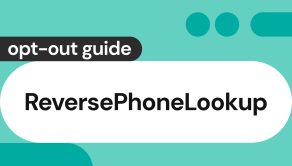


Dimitri is a tech entrepreneur and founder of Onerep, the first fully automated data removal service. Top cybersecurity CEO of 2021 by The Software Report.